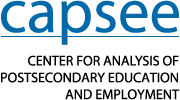The Labor Market Returns to Math in Community College: Evidence Using the Education Longitudinal Study of 2002
By: Clive Belfield | October 2015
This paper examines the returns to math courses relative to those in courses in other subjects for students who started their postsecondary education at community college. The limited available evidence presumes that college-level math is valuable in the labor market relative to other coursework. Using data on college transcript and earnings from the Education Longitudinal Study of 2002, the author estimates the relative effects of college-level math on attainment and earnings in early adulthood.
The analysis shows clear attainment effects: College-level math is more strongly associated with receiving a college award than is college-level coursework in other disciplines. However, when controlling for attainment, there is little evidence that math courses are associated with increased earnings. The overall effect of math coursework on earnings is therefore modestly positive or close to zero. In addition, high school math and college-level math are positively correlated: Failure to control for college-level math leads to an upward bias in estimating the effects of high school math on earnings. Finally, it is worth noting that, given high student transfer rates, it is important to have transcript information for all colleges attended by a given student when conducting this kind of analysis. The amount of college-level math coursework completed by community college students is almost doubled in the current study when accounting for math courses at all colleges attended by each student.
